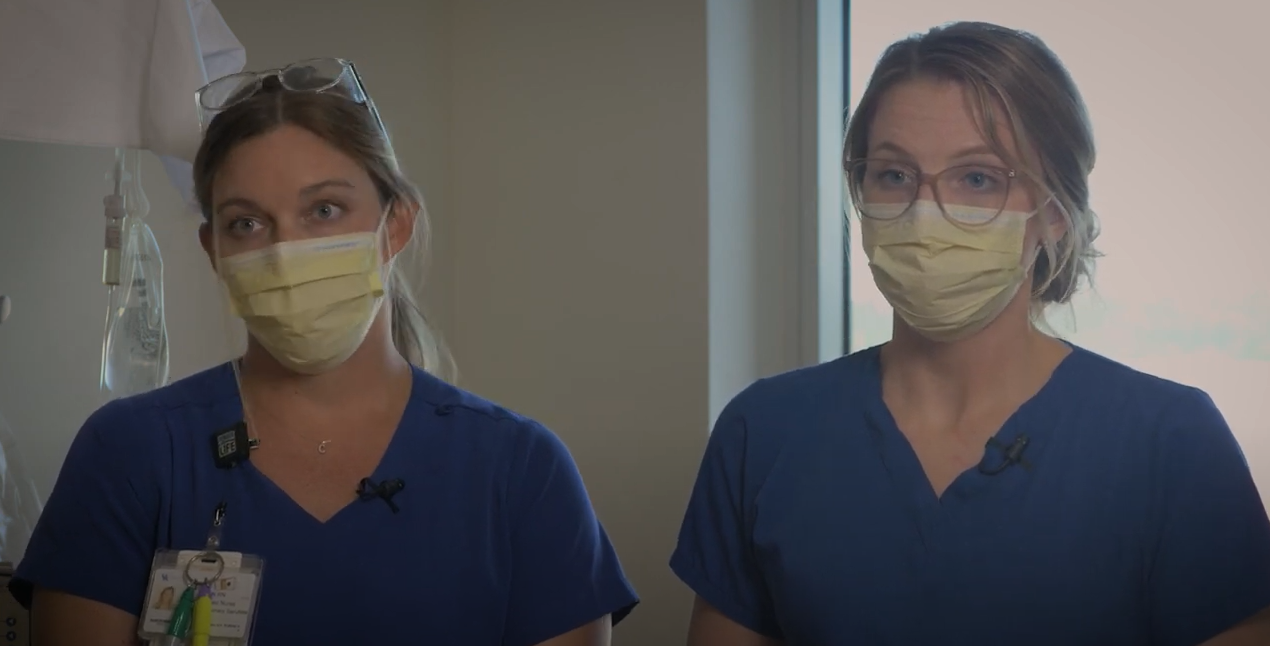Voices from the Front Lines: Corie Roberts and Meg Perkins

We recently joined hospital staff for a few days to document the reality of treating COVID-19 patients in UK HealthCare clinical settings.
This edited interview is part of our ongoing series, “UK HealthCare: Voices from the Front Lines,” highlighting stories and perspectives from our frontline staff who have been caring for the sickest COVID-19 patients since March 2020.
Corie Roberts, RN, has worked in UK HealthCare’s medicine intensive care unit (MICU) for a year and a half.
Megan Perkins, RN, has worked in the MICU for almost six years.
What has it been like caring for COVID patients over the past year and half?
CORIE: I got a job here right when COVID started. It was really terrifying at first. I still remember when we heard that we got our first patient and we were scared that COVID could go through the vents. It's been overwhelming, I guess is the best word. But I've learned a lot.
MEGAN: Well, first of all, I really applaud our new hires from last March and after because they have started in what's arguably the hardest time to ever start working in a pulmonary ICU unit. So I think they've all done great, especially Corie.
For me, whenever this first started last March, I remember us going to these trainings on how to put on PPE. And then there was like this fear of, you know, we don't have enough N95 masks, so this is how you save your N95. And there was just this constant fear of me taking it home to my family and spreading it around to the community.
But then since then, we've had the opportunity to get the vaccine. We're still afraid to spread it, but I'm not as afraid for myself to get COVID and get really sick. It's more the acuity of these patients that we're having to take care of – they're much sicker this second round. They're much younger and just overall much more difficult to care for.
How has the latest surge been different than the first waves of COVID?
CORIE: The first surge, we saw older people people who were either elderly or severely immunocompromised, which was still sad and terrifying. But now you're having people come in that are younger than you. I mean, we're 29 years old. And when you have a patient coming in, that's 22, 23 years old, that has COVID and you just know how it plays out. I mean, it's terrifying and heartbreaking, especially when I personally feel like we've been given the opportunity to slow or stop the spread.
This time, it's not your grandma and grandpa (ending up in the hospital). It's your mom and dad and your brother and your sister and your friend laying in there in the bed. So that would be the biggest difference to me.
MEGAN: I totally agree. It's been a lot younger people, and we have seen a surge of pregnant women on the unit as well, that we haven't didn't necessarily see as much of last year. And like Corie said, we have the opportunity to prevent this from happening through vaccines, through using a mask. And unfortunately people aren't always taking advantage of that. It's heartbreaking to see because a lot of this is preventable, and we kind of feel helpless because there's not much we can do about it.
What keeps you both motivated?
CORIE: My motivation is my coworkers: the nurses, the techs, the respiratory therapists, our managers, and our doctors and their residents. They're the reasons that I do it. I mean, obviously I became a nurse to care for the patients and make a difference in these people's lives, but COVID is different. Sometimes you feel very helpless, like you aren't making a big difference.
MEGAN: I would pretty much agree with Corie. The team we have here is excellent. We're friends, we're not just coworkers. We all care about each other and that's what keeps me coming back. I've worked in the medicine ICU since I've been a nurse, and I have always loved it. And I still enjoy it. It's much tougher now, but I just look forward to when we get over this and get back to normal.
Are there any memories that stand out to you from the past year and a half?
CORIE: When I first started as a nurse, I was caring for a COVID-recovered patient. So that means you've been here for 20 days past your first positive date (and you’re no longer contagious). And so his wife got to see him for the first time since he had been admitted to the hospital. She never did a FaceTime cause she was kind of setting herself up for coping with the chance that he was going to die. So I remember the first time she got to see him, and I remember just watching him recover, although his full recovery took a year. Just seeing that progress really makes you hopeful that there can be others to go through that too.
What's the most important thing that you want people to understand about COVID?
CORIE: I would say that COVID does not discriminate, no matter your race, your socioeconomic status how healthy you are age nothing. It doesn't matter. COVID is out there and it's real. So just get the vaccine. It's available for everybody, so get the vaccine, wear your mask and social distance the best you can.
MEGAN: I would also say just get your vaccine. If you have questions or concerns, that's perfectly fine, but just get your information from credible sources. Talk to your doctor, and don't just listen to stuff that you may see on social media.




